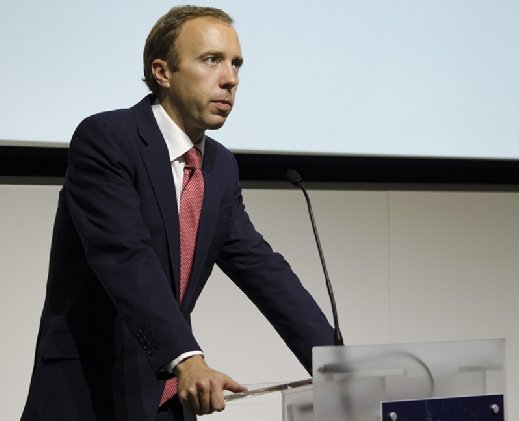
Matt Hancock, the creator of the Matt Hancock app, is sitting in Matt Hancock’s office at the Department for Digital, Culture, Media and Sport (DCMS), in a Matt Hancock director’s chair from Pinewood Studios, drinking coffee from a Matt Hancock mug. Earlier, he was rolling a cricket ball between his hands – there’s no evidence to suggest the ball was also Matt Hancock branded.
Standing out from his regulation Conservative Party blue suit and crisp white shirt, he’s wearing a 1970s-style orange plastic Casio digital watch, which he happily explains came about because he wanted to go “old school” when he uses so much modern technology in the rest of his life. He has, for now at least, ditched his Apple Watch.
As secretary of state at DCMS, Hancock is the cheerleader for the technology sector in government – perhaps the first Cabinet minister with such a voice on behalf of the digital economy. He’s certainly the first politician to have reached the exalted heights of the Cabinet off the back of proving his capability in the digital sphere.
He stepped up to run DCMS in January this year in Theresa May’s latest reshuffle, 18 months after being demoted by May when she took over as prime minister. Before entering Parliament he was chief of staff to former chancellor turned newspaper editor George Osborne, and perhaps because of those close links – Osborne was sacked by May on her appointment – Hancock was initially shifted by May from Cabinet Office minister, where he was responsible for the Government Digital Service (GDS), to a more junior role as digital minister at DCMS.
Unlike his former boss, Hancock got his head down, got on with his new brief, and was ultimately rewarded with promotion to the Cabinet. He’s a smooth, confident talker – reminiscent in that respect of David Cameron – and flagged by many in Westminster as a politician on the rise.
Global digital leader
He invited journalists for a briefing ahead of London Tech Week, where he hopes to promote the government’s pro-technology credentials. He comes across as genuine in his desire for a post-Brexit UK that has a significant focus on being a global leader in digital.
“We are very keen to articulate the fact that the level of investment into tech has doubled in the past year; that the UK is ahead of France, Germany and Spain put together; and that building this ecosystem is mission critical,” he said.
 Matt Hancock, secretary of state, DCMS: “It’s very important we have a visa system that both controls immigration and also ensures that the brightest and the best talent from around the world can come here”
Matt Hancock, secretary of state, DCMS: “It’s very important we have a visa system that both controls immigration and also ensures that the brightest and the best talent from around the world can come here”
“There are also new statistics showing that export trade in digital from the UK has grown by 20% over the past year. This is very strong and much faster than the rest of the economy.”
He describes the UK as a “digital dynamo”, and jokingly warns that we will hear that phrase repeated often by the government in the coming months.
But for all Hancock’s championing of tech, he’s been reluctant to publicly address the digital sector’s significant concerns about the impact of Brexit. He’s not going to break any government-approved lines on the ongoing negotiations, but his department is responsible for two key Brexit-affected areas – skills and data.
Skills shortages
Some 18% of UK IT professionals were born overseas, according to trade body TechUK, and with growing talent shortages, restrictions on the availability of people could hold back the UK’s digital economy.
More than three-quarters of UK organisations are experiencing challenges in recruiting people with digital skills, according to research from Deloitte. But at the same time, thousands of IT workers eligible for Tier 2 skilled visas in the UK are being refused entry due to government immigration caps.
Immigration policy is outside Hancock’s remit, but he understands the problem.
“We want to see people with great talent who can contribute to our country coming here. We’ve already increased the number of exceptional talent visas and I’m in constant discussions with the tech industry,” he said.
“It’s very important we have a visa system that both controls immigration and also ensures that the brightest and the best talent from around the world can come here. We’ve already shown that we are determined to ensure that exceptional people with exceptional talents who can add a lot to Britain can come here and work and start businesses and grow businesses, and I want to see that continue in the future.”
Reading between the lines, it’s likely that Hancock would support any proposals to reconsider the caps on Tier 2 visas to help the tech sector address its growing skills gap.
Free flow of data
His DCMS team has been in Brussels recently to negotiate with the EU on the free flow of data, and Hancock is confident this is one area of Brexit where there will be agreement, due to the UK embracing the General Data Protection Regulation (GDPR), which became law through the Data Protection Act, which received Royal Assent last month.
However, he’s already been rebuffed by the EU on his request for the UK’s privacy watchdog, the Information Commissioner’s Office (ICO), to remain involved in the bloc’s data protection policy after Brexit. Negotiations are ongoing.
Another topic that’s taken Hancock’s interest is the relationship between technology and productivity. The UK is perceived to have a significant productivity deficit compared with major rivals such as France, Germany and the US. However, some economists counter that the way GDP is measured no longer reflects the role of the digital economy – in particular, the fact that so many internet services that enrich our lives are free.
As Hancock puts it: “If I use Google Maps to walk across the park instead of taking a taxi, then that reduces measured GDP, even though it improves my real income and improves my productivity.”
Measuring the digital economy
The Treasury has given £4m to the Office for National Statistics to examine how the digital economy affects the way GDP is measured. The UK has one of the largest digital proportions of GDP among leading nations, and Hancock suggests it wouldn’t be difficult to make a link with the UK also having lower productivity.
“I think the measurement of productivity has been fundamentally changed by digital technology, where a whole series of things we had to pay for are now free. I don’t think the subject of economics has yet caught up with the impact of zero marginal cost production or of products that are free,” he said.
Since taking over at DCMS, Hancock has expanded his empire by taking responsibility for data policy away from his old home at the Cabinet Office, and he revealed that he has also now taken over digital identity policy, formerly owned by GDS. It’s clear he hopes to break the logjam in the private sector identity ecosystem caused by the delays and performance problems in GDS’s Gov.uk Verify system.
“Getting a high-quality system for digital identity is incredibly important. This matters both inside government for people to access government services effectively, and in the wider economy. The more these two things are tied together the better,” said Hancock.
Regulating internet companies
Meanwhile, he’s also tasked with tackling the challenges of social media companies, their use of our personal data, and their cooperation – or lack of it – in regulating what goes on in their platforms. Here, too, Hancock is – inevitably – optimistic about what can be achieved. He believes it’s possible to be both “pro-tech” and “pro-privacy”. But he’s clear that the internet companies need to change.
“It’s obvious that social media platforms are not publishers in the full sense of the word, like a book publisher, but they’re also not purely conduits of other people’s information. We are looking at whether and how the law should be updated to reflect this to preserve the essential freedoms of the internet, which are a very powerful force for good, but also to mitigate some of the harms and to help ensure people can protect their intellectual property and make sure that some of the online harms are better policed,” he said.
“We’re working with the companies and also with wider civil society to make sure we get the future laws right. We don’t rule out legislation, and it’s best if this approach is done internationally. But it doesn’t have to be because, ultimately, we need political accountability over an area of life where there is a huge amount of power in the hands of a very small number of people, and that is legitimately done through national legislation. We’re working with people across the world to try to get this balance right.”
The tech sector has welcomed Hancock’s rise to the top table in government, seeing him largely as an ally, and one with sufficient understanding of his brief to make a difference. As Hancock is fond of pointing out in speeches, his family built a small software company in Chester, where he once worked.
“I have a real interest in all this stuff,” he said, with genuine enthusiasm.
Like any politician, his ambitions no doubt lie beyond the digital elements of his current remit, but for now, he’s keen to convince people in IT that he has their interests at heart.
Be the first to comment